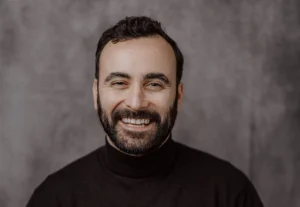Ahead of our UniverCITY Talk: Our Place in Space on 25 November, we caught up with Güneş Ünüvar from the Luxembourg Centre for European Law (LCEL) to talk about why space law is the ultimate party trick and the challenges of regulating orbit.
So, space lawyer. Does that line actually work at parties?
It really is the perfect icebreaker! I often joke about this: when I tell people I’m an investment lawyer, they lose interest. But when you say you’re a space lawyer? Suddenly everyone’s interested. I feel like everyone is interested in space. Everyone looks up at the moon and wonders, what is it doing there? It’s a very inherent thing.
What brought you to Luxembourg five years ago?
I came to the Max Planck Institute to work on foreign investment law, so it wasn’t very related to space initially. But I realised Luxembourg is very much interested in space, not only as policy-making but also as a way to attract foreign companies. Luxembourg was one of the first to treat space resources, like mining, as a sector.
I had the opportunity to merge my existing expertise with this new context. We have companies doing active debris removal, developing medicine in zero gravity, world-renowned companies like Ispace Europe and SES. I really cannot think of a better place to do this than Luxembourg.
You’re also the legal advisor for the Moon Village Association. What’s that about?
It’s an NGO focusing on lunar stakeholder dialogue. We work with all kinds of stakeholders: states, private companies, other non-governmental organisations, scientific institutions, universities. We are trying to create synergies in the domain of outer space, specifically lunar governance. So basically, we are figuring out the rules before we all move to the moon.
Speaking of rules, what’s the biggest challenge in space law right now?
The balancing act between innovation and sustainability. We know how badly we’ve done on Earth. Do we really want to make the same mistakes on the moon or other celestial objects? There has to be a better way than how we’ve done it here.
The problem is, if we want to keep going to space, we need clean orbits. If Earth’s orbit becomes too cluttered, we literally can’t leave the planet. You’ll be grounded for centuries until it clears itself. But we also want innovation and technology development and for that we have to send things into orbit. Where’s the balance between being too permissive or too restrictive? That’s the essence of the space sustainability debate.
What can people expect from the upcoming UniverCITY Talk?
I want people to understand why these rules and laws matter to them personally. Why should you care about the law governing a satellite? Because it affects everything: your navigation, weather forecast, even national security.
My co-panellists bring different expertise. Miguel Olivares Mendez is a robotics professor who’ll talk about what’s technically possible on the moon. Sabrina Alam works on sustainability and defence issues. It’s going to be a rich conversation, and honestly, I’m looking forward to learning from them too.
Let’s get philosophical. Where will we be in 20 years?
That’s a very tough question. It really depends on political will. If we were in 1969, having just witnessed Apollo 11, we would say, “By 1989 we’ll be on Mars!” But it didn’t happen that way. There are moments where space becomes exciting, then suddenly political will vanishes.
In 20 years we could be on Mars if we are absolutely determined, but it is still ambitious. I’m not a physicist, but I think if we put our minds to it, we’ll have advanced quite a bit. Certainly, there will be some permanent presence on the moon. Space is hard, as they say. But I hope in our lifetimes we’ll see some form of permanent scientific facility on the moon at least.
What about space tourism?
It’s already happening! Of course you have to be very, very rich. I don’t know how commercially viable it will be in, say, 10 years. But if we do it sustainably and responsibly, I’m all for it. Maybe having more people in orbit will actually help. The astronauts say everyone becomes very poetic when they’re in orbit. They say, “I don’t see any borders here. The Earth looks so fragile from orbit.” Maybe if we have more people actually having these epiphanies, we’ll also have a better planet.
Any book and film recommendations for aspiring space enthusiasts?
Definitely Carl Sagan’s Cosmos. Or basically anything written by Carl Sagan! For fiction, 2001: A Space Odyssey is a classic. And there’s a brilliant book called The Dispossessed by Ursula K. Le Guin about two planets with very different political systems orbiting each other. It was written at the height of the Cold War, so you can feel that political tension. It’s absolutely brilliant!
Fun fact: is it true your name means “sun” in Turkish?
It does! And there’s actually a family theme going on: my brother is called Ateş, which means “fire”. My dad’s name is Süha, which is another star. My mother’s maiden name was Yıldız, which means “star”. So there is this coincidental obsession with celestial objects. I guess you could say it was destiny.
